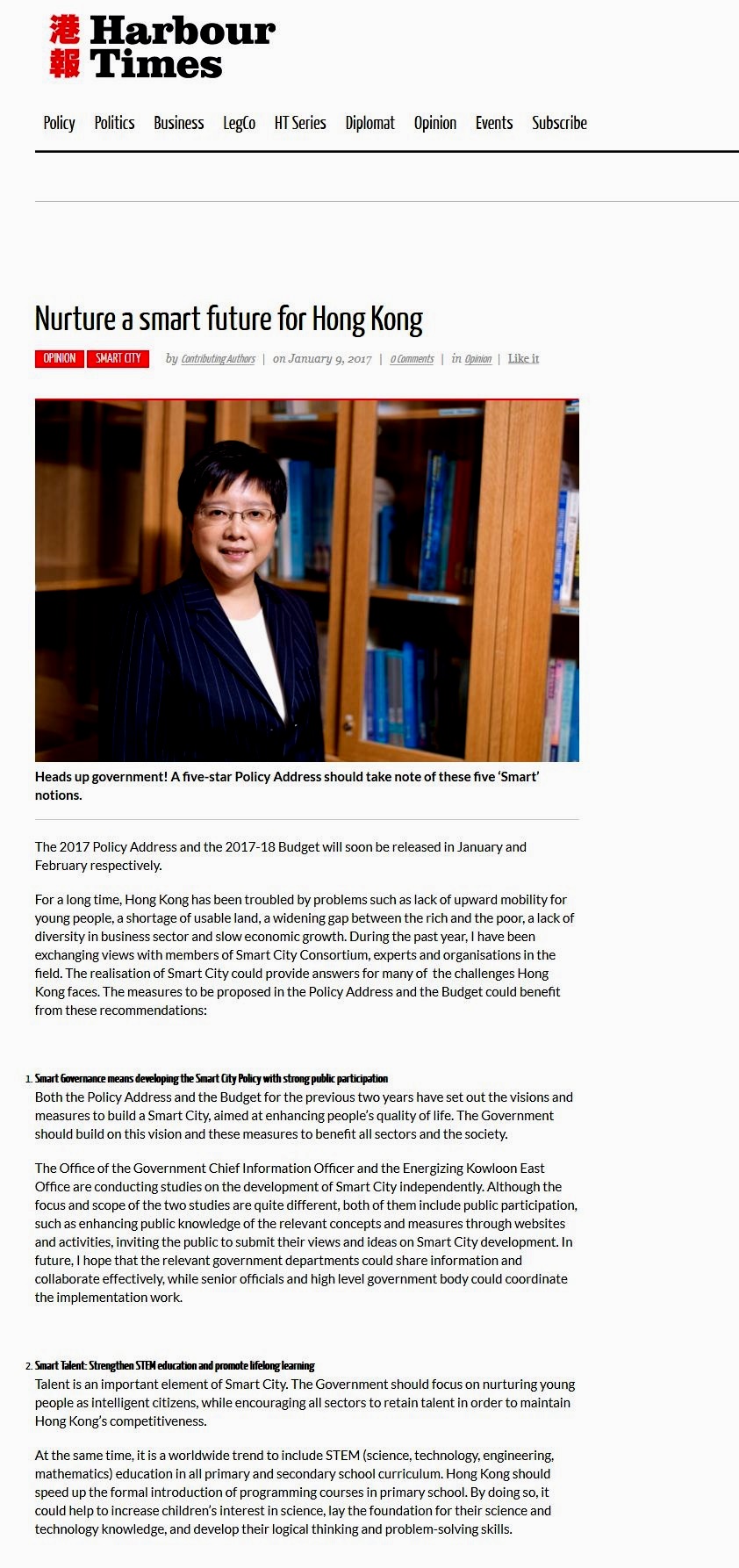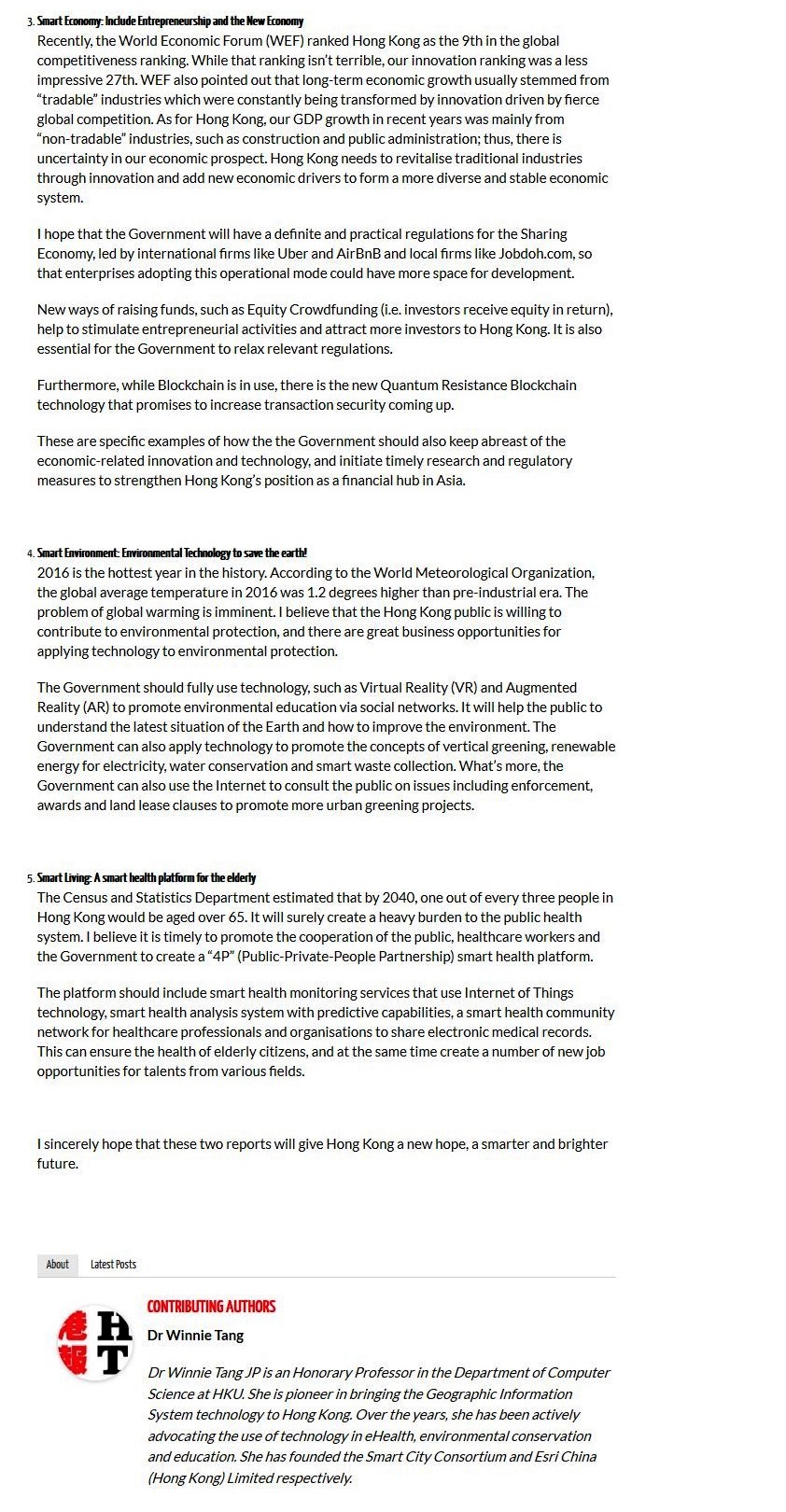網上版請按此


Nurture a smart future for Hong Kong
The 2017 Policy Address and the 2017-18 Budget will soon be released in January and February respectively.
For a long time, Hong Kong has been troubled by problems such as lack of upward mobility for young people, a shortage of usable land, a widening gap between the rich and the poor, a lack of diversity in business sector and slow economic growth. During the past year, I have been exchanging views with members of Smart City Consortium, experts and organisations in the field. The realisation of Smart City could provide answers for many of the challenges Hong Kong faces. The measures to be proposed in the Policy Address and the Budget could benefit from these recommendations:
Smart Governance means developing the Smart City Policy with strong public participation
Both the Policy Address and the Budget for the previous two years have set out the visions and measures to build a Smart City, aimed at enhancing people's quality of life. The Government should build on this vision and these measures to benefit all sectors and the society.
The Office of the Government Chief Information Officer and the Energizing Kowloon East Office are conducting studies on the development of Smart City independently. Although the focus and scope of the two studies are quite different, both of them include public participation, such as enhancing public knowledge of the relevant concepts and measures through websites and activities, inviting the public to submit their views and ideas on Smart City development. In future, I hope that the relevant government departments could share information and collaborate effectively, while senior officials and high level government body could coordinate the implementation work.
Smart Talent: Strengthen STEM education and promote lifelong learning
Talent is an important element of Smart City. The Government should focus on nurturing young people as intelligent citizens, while encouraging all sectors to retain talent in order to maintain Hong Kong's competitiveness.
At the same time, it is a worldwide trend to include STEM (science, technology, engineering, mathematics) education in all primary and secondary school curriculum. Hong Kong should speed up the formal introduction of programming courses in primary school. By doing so, it could help to increase children's interest in science, lay the foundation for their science and technology knowledge, and develop their logical thinking and problem-solving skills.
Smart Economy: Include Entrepreneurship and the New Economy
Recently, the World Economic Forum (WEF) ranked Hong Kong as the 9th in the global competitiveness ranking. While that ranking isn’t terrible, our innovation ranking was a less impressive 27th. WEF also pointed out that long-term economic growth usually stemmed from “tradable” industries which were constantly being transformed by innovation driven by fierce global competition. As for Hong Kong, our GDP growth in recent years was mainly from “non-tradable” industries, such as construction and public administration; thus, there is uncertainty in our economic prospect. Hong Kong needs to revitalise traditional industries through innovation and add new economic drivers to form a more diverse and stable economic system.
I hope that the Government will have a definite and practical regulations for the Sharing Economy, led by international firms like Uber and AirBnB and local firms like Jobdoh.com, so that enterprises adopting this operational mode could have more space for development.
New ways of raising funds, such as Equity Crowdfunding (i.e. investors receive equity in return), help to stimulate entrepreneurial activities and attract more investors to Hong Kong. It is also essential for the Government to relax relevant regulations.
Furthermore, while Blockchain is in use, there is the new Quantum Resistance Blockchain technology that promises to increase transaction security coming up.
These are specific examples of how the the Government should also keep abreast of the economic-related innovation and technology, and initiate timely research and regulatory measures to strengthen Hong Kong's position as a financial hub in Asia.
Smart Environment: Environmental Technology to save the earth!
2016 is the hottest year in the history. According to the World Meteorological Organization, the global average temperature in 2016 was 1.2 degrees higher than pre-industrial era. The problem of global warming is imminent. I believe that the Hong Kong public is willing to contribute to environmental protection, and there are great business opportunities for applying technology to environmental protection.
The Government should fully use technology, such as Virtual Reality (VR) and Augmented Reality (AR) to promote environmental education via social networks. It will help the public to understand the latest situation of the Earth and how to improve the environment. The Government can also apply technology to promote the concepts of vertical greening, renewable energy for electricity, water conservation and smart waste collection. What's more, the Government can also use the Internet to consult the public on issues including enforcement, awards and land lease clauses to promote more urban greening projects.
Smart Living: A smart health platform for the elderly
The Census and Statistics Department estimated that by 2040, one out of every three people in Hong Kong would be aged over 65. It will surely create a heavy burden to the public health system. I believe it is timely to promote the cooperation of the public, healthcare workers and the Government to create a “4P” (Public-Private-People Partnership) smart health platform.
The platform should include smart health monitoring services that use Internet of Things technology, smart health analysis system with predictive capabilities, a smart health community network for healthcare professionals and organisations to share electronic medical records. This can ensure the health of elderly citizens, and at the same time create a number of new job opportunities for talents from various fields.
I sincerely hope that these two reports will give Hong Kong a new hope, a smarter and brighter future.
Dr. Winnie Tang
Chairman of the Steering Committee of Smart City Consortium